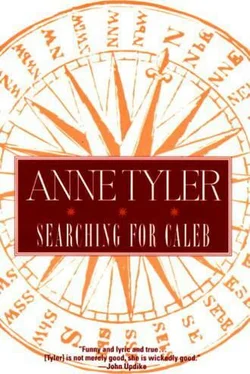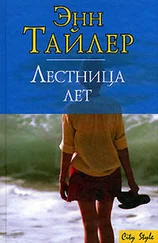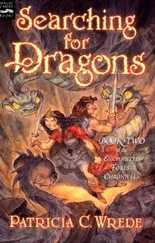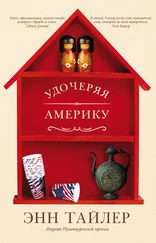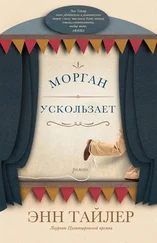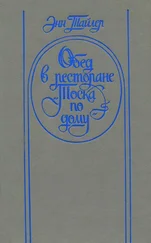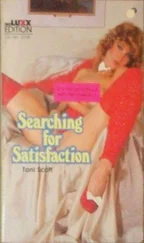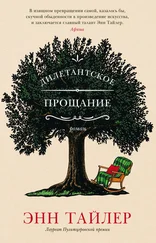* * *
In an airport waiting room, at eleven thirty in the morning, Justine sat in a vinyl chair with her straw bag balanced on her knees. She was watching a group of students on standby. The regular passengers had already filed through, and now an official took a stack of blue tickets from his podium and began calling out each standby’s name. They cheered and came forward, one by one. They accepted their tickets like Oscars, smiling at the official and then waving triumphantly to their friends, who clapped. Justine clapped too. “Mr. Flagg!” the official called. “Mr. Brant!” Mr. Flagg beamed. Mr. Brant kissed his ticket. “Mrs. Peck!” And though Justine had no one with her, she was so carried away by all the gaiety that she beamed too, and turned back to bow to the empty row of chairs before she headed through the gate marked New Orleans .

18
At night, in his narrow white cot, with old men wheezing and snoring all around him, he lay flat on his back and smiled at the ceiling and hummed “Broken Yo-Yo” till the matron came and shut him up. “Just what do you think you’re doing?” He didn’t answer, but the humming stopped. A fellow at the end of the row called out for a bedpan. The matron left, on dull rubbery heels. The fellow went on calling for a while but without much interest, and eventually he fell silent and merely squeaked from time to time. Caleb continued smiling at the ceiling. What no one guessed was that “Broken Yo-Yo” was still tumbling note on note inside his head.
From four a.m. till five he slept, dreaming first of a cobbled street down which he ran, more agile than he had been in years; then of fields of black-eyed Susans; then of grim machinery grinding and crumpling his hands. He awoke massaging his fingers. The ache was always worse in the early morning hours. He lay watching the darkness lift, the ceiling whiten, the sky outside the one gigantic window grow opaque. The tossing forms around him stilled, signifying wakefulness, although none of them spoke. This was the hour when old men gave in to insomnia, which had been tracking them down all night. They would rather not admit their defeat. They lay gritting their gums together, tensed as if on guard, betraying themselves only by a dry cough or the occasional sandpapery sound of one foot rubbing against the other. Caleb was stillest of all, but now “Stone Pony Blues” was spinning between his ears.
At six o’clock the matron came to snap on a switch. Long after she had gone, fluorescent tubes were fluttering and pausing and collecting themselves to fill the room with glare. The sky appeared to darken again. Morning came later now; it was fall. In December he would have been here seven years and he knew every shadow and slant of light, all the sounds of night and morning and mealtimes, which he tabulated with a sense of contentment.
Those who could manage for themselves began to struggle out of bed and into their bathrobes. Caleb’s bathrobe was a rubberized raincoat, whose belt he tied clumsily without moving his fingers. He had asked Roy’s wife Luray for a real bathrobe this coming Christmas and he was fairly certain she would bring him one. He slipped his feet into paper scuffs and went off across the hall to the toilets. Already a line had formed. While he waited he hummed. The old men went on discussing their constipation, indigestion, leg cramps, and backaches. They were used to his humming.
For breakfast there were grits, shredded wheat biscuits, and coffee. The men sat on long wooden benches, eating from tin plates with compartments. The women sat on the other side of the dining hall. They could have mingled with the men if they wished but they didn’t, perhaps preferring not to be seen in their flowered dusters, with their veiny white legs poking out and their scalps showing through the thin strands of hair. Caleb, however, bowed and smiled in their direction before taking his place on a bench.
After breakfast they went to the social room. Some watched television, most just stared into space. Those who were crippled were wheeled in and parked like grocery carts. A gin rummy game started up in one corner but lapsed, with the players merely holding their cards and sitting vacantly as if frozen. A man with a cane told another man how his son had done him out of a house and five acres. Caleb himself did not have anyone to talk to at the moment. His only friend had died in August. Jesse Dole, a horn player who had been recorded several times in the days when you blew into a large black morning glory and it came out of another morning glory in someone’s parlor. They used to sit in this very spot between the radiator and the Formica coffee table, arguing the fine points of their different styles of music. Then one night Jesse died and they collected him in his bedsheet and swung him onto a stretcher, leaving Caleb to spend his days all alone with the vinyl chair beside him empty. The others thought he was a little odd. They didn’t have much to do with him. But Caleb was accustomed to making friends with anyone, and he knew that sooner or later he would find somebody or somebody would find him, maybe some new man coming in with new stories to tell. Till then, Caleb sat tranquilly in the social room with his knotty hands resting on his knees and his eyes fixed upon the green linoleum floor. For lack of anything else he had begun thinking back on his memories, which wasn’t like him. He had never been a man to dwell on the past. Leaving places, he forgot them, always looking ahead to the next; but he had supposed that someday he would have the time to sit down and take a look at where he had been and this must be it.
New Orleans in the early part of the century: jitney dances at the Okeh Pavilion and the faint strains of quadrilles, schottisches, and polkas, and musical beggars one to a block playing anything that made a fine noise. White-Eye Ramford bowling along the sidewalk with his buckle-kneed gait, plucking notes like little golden fruits and singing and stumbling so you thought he was drunk, till you saw his flickering black paper eyelids and the blind, seeking roll of his head. He had lost his sight at twelve or maybe twenty, his stories differed; and by the time he reached middle age he should have learned how to navigate but he hadn’t. He was hopeless. A plump, clumsy, hopeless man with a mild face, wincing when he stumbled and then moving on, resigned, plucking more notes from his cracked guitar. He wore a ragged white carnation in his buttonhole, and a derby on his head. It was the fall of 1914. Caleb was on his way home from the sugar refinery and he stopped and stared. Then he followed behind. Till the blind man called, “Who that?” and Caleb melted into a doorway. The next day, the same street, Caleb brought along his fiddle. When he heard the guitar he started playing. High haunting notes wailed and rose, commenting on the tune, climbing behind it. He had known immediately what this sort of music required. The guitar readjusted, making way for the fiddle, and the two of them continued down the street. Someone dropped a coin into a lard bucket hanging from the guitarist’s belt. “Thank you,” said Caleb, always well mannered. The guitarist spun around. “ White man?” he cried. Caleb was so pleased at his surprise that he hardly noticed he was left standing foolishly alone. He was certain (because he wanted it so much) that the two of them would meet again, and that he would go on playing his fiddle behind the cracked guitar until he was accepted. Or tolerated, at least. Or recognized to be unavoidable.
In 1912 or 1913 you could run into Caleb Peck in just about any sporting house or dance hall in the city, always propped against the piano or the edge of the bandstand, puzzled and wistful, worn down from his menial daytime job, hoping to be allowed to fill in for some musician, though no one was that eager to have him. After all he did not play any brass, and most had no use for a fiddle. As for piano, he was a musical Rip Van Winkle. He had learned from a man who left New Orleans in the nineteenth century, when jazz was still spelled with two s’s. So in 1912 and 1913 Caleb merely hung around the edges of places, with a thin strained face from so much listening, from absorbing so much, from trying to understand. But in 1914 he discovered the blues, which he understood instantly without the slightest effort, and for the next twenty years you could find him in the same small area of the Vieux Carré, linked to a blind man by a length of twine and playing a fiddle above a slippery song.
Читать дальше
